In today’s rapidly evolving e-commerce landscape, entrepreneurs constantly seek platforms that offer flexibility, scalability, and affordability. Shopify has long been a go-to solution for creating online stores, but it may not be the perfect fit for everyone, especially in India. Whether you’re looking for a more cost-effective option, better customization, or localized solutions, this article explores the best Shopify alternatives in India to help you make an informed choice.
In this guide, we’ll cover some of the best Shopify options available in India, including Dukaan, Instamojo, OpenCart, and Zepo, along with other top contenders like Wix, WooCommerce, and Magento.
Why Look for Shopify Alternatives?
While Shopify is powerful, its costs can increase, and its customization options might not be flexible enough for some users. Additionally, Shopify’s limited integration with Indian payment gateways can be a dealbreaker for many Indian businesses. If you want more flexibility, better local payment integration, or a more affordable option, it’s worth exploring Shopify alternatives.
Before diving into the alternatives, let’s first understand why some users might consider switching from Shopify:
- Cost: Shopify’s monthly subscription fees can be prohibitive for small businesses and startups.
- Customization: While Shopify offers a lot of themes, some users feel restricted by its design limitations.
- Transaction Fees: Shopify imposes additional transaction fees unless you use Shopify Payments, which may not be the most convenient option in India.
- Localized Support: Shopify’s global support can sometimes fail to address the unique needs of Indian merchants.
With these pain points in mind, let’s explore the best Shopify alternatives available in India.
The Growing E-commerce Landscape in India
India’s e-commerce landscape is booming. Whether you’re selling locally or aiming for a global audience, the ability to cater to local consumer needs—like offering UPI payments, supporting regional languages, or integrating with Indian shipping services—is critical. Many platforms now cater specifically to the Indian market, making them ideal Shopify alternatives for Indian businesses.
Key Factors to Consider When Choosing a Shopify Alternative
Before diving into the alternatives, it’s essential to understand what to look for in an e-commerce platform:
Pricing and Affordability
Different platforms come with varied pricing plans. Look for an option that balances affordability with the features your business needs. Some platforms offer free or low-cost options, while others might charge based on sales volume or advanced functionalities.
Customization and Flexibility
If you want complete control over your store’s design and functionality, you’ll need a platform that allows more customization than Shopify. Some platforms offer drag-and-drop editors, while others may require coding knowledge for advanced tweaks.
Payment Gateway Integration
In India, it is crucial to easily integrate with popular local payment methods like Paytm, Razorpay, and UPI. Some Shopify alternatives offer better support for Indian payment gateways, making them more convenient for local businesses.
Ease of Use and Support
Not every business owner is a tech expert. A user-friendly interface and excellent customer support are essential, especially for small businesses or entrepreneurs just starting.
Top Shopify Alternatives in India
Let’s take a closer look at some of the best Shopify alternatives that cater to the Indian market:
1. Wix
Wix is an easy-to-use website builder that offers an e-commerce option. Its drag-and-drop interface makes it perfect for beginners who want to create a beautiful, functional store without coding.
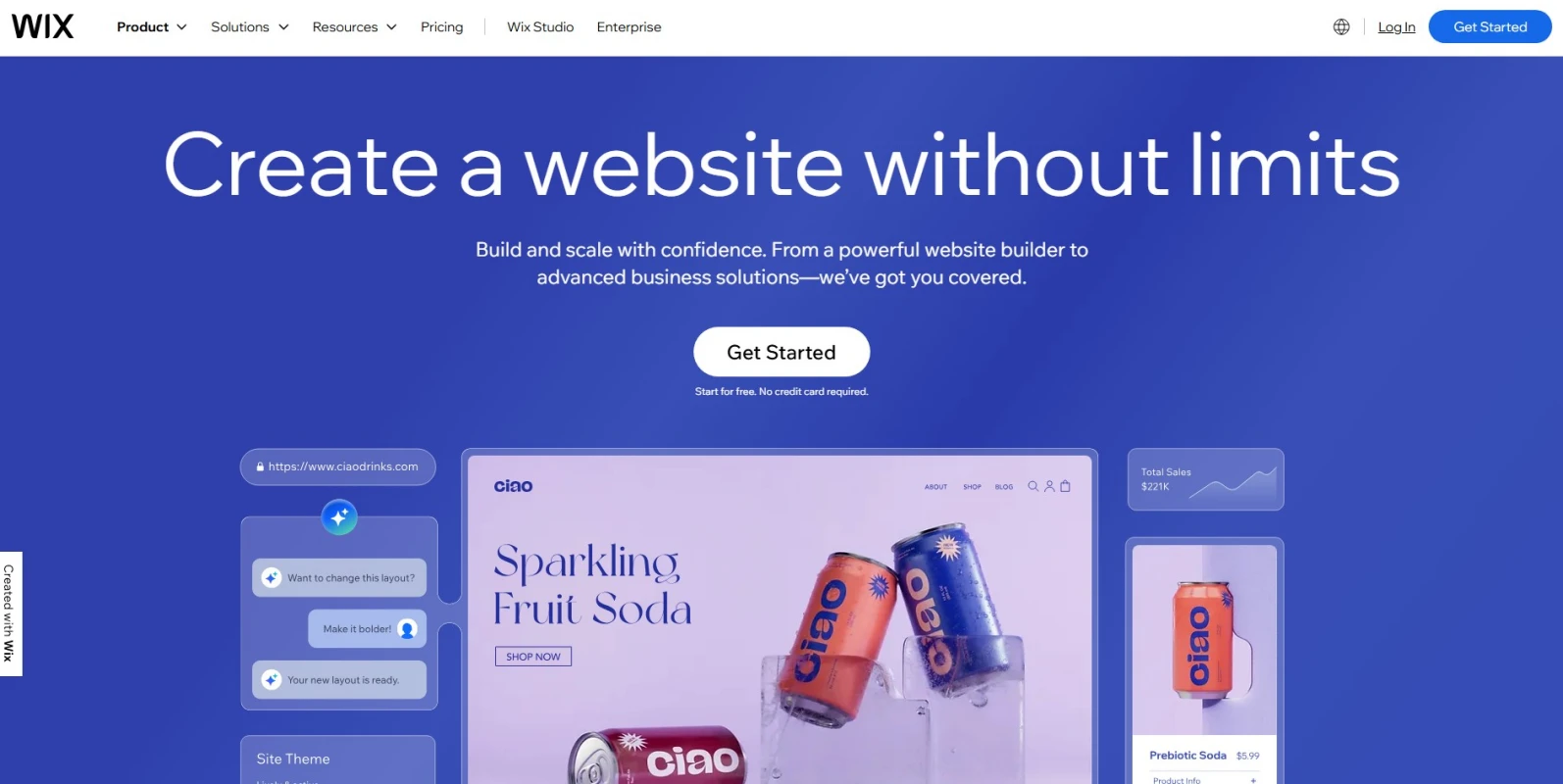
Why Wix eCommerce?
- Beginner-friendly: Its drag-and-drop editor makes it extremely easy to design your store, even without technical expertise.
- Affordability: Wix is more affordable than Shopify, especially for small to medium-sized businesses.
- Mobile optimization: Offers mobile-friendly designs and optimized checkouts.
Downsides:
- Limited scalability for larger businesses.
- Fewer third-party integrations compared to Shopify and WooCommerce.
Pricing:
- Light Plan: ₹199/month
- Core Plan: ₹399/month
- Business Plan: ₹799/month
- Elite Plan: ₹1,599/month
Note: Prices may vary based on additional features or promotional offers.
Ideal For: Entrepreneurs who want a simple, affordable solution for creating an online store without too much technical knowledge.
2. WooCommerce
WooCommerce is an open-source e-commerce plugin for WordPress. It’s highly flexible, allowing you to customize your store exactly how you want, with endless plugins to extend its functionality.
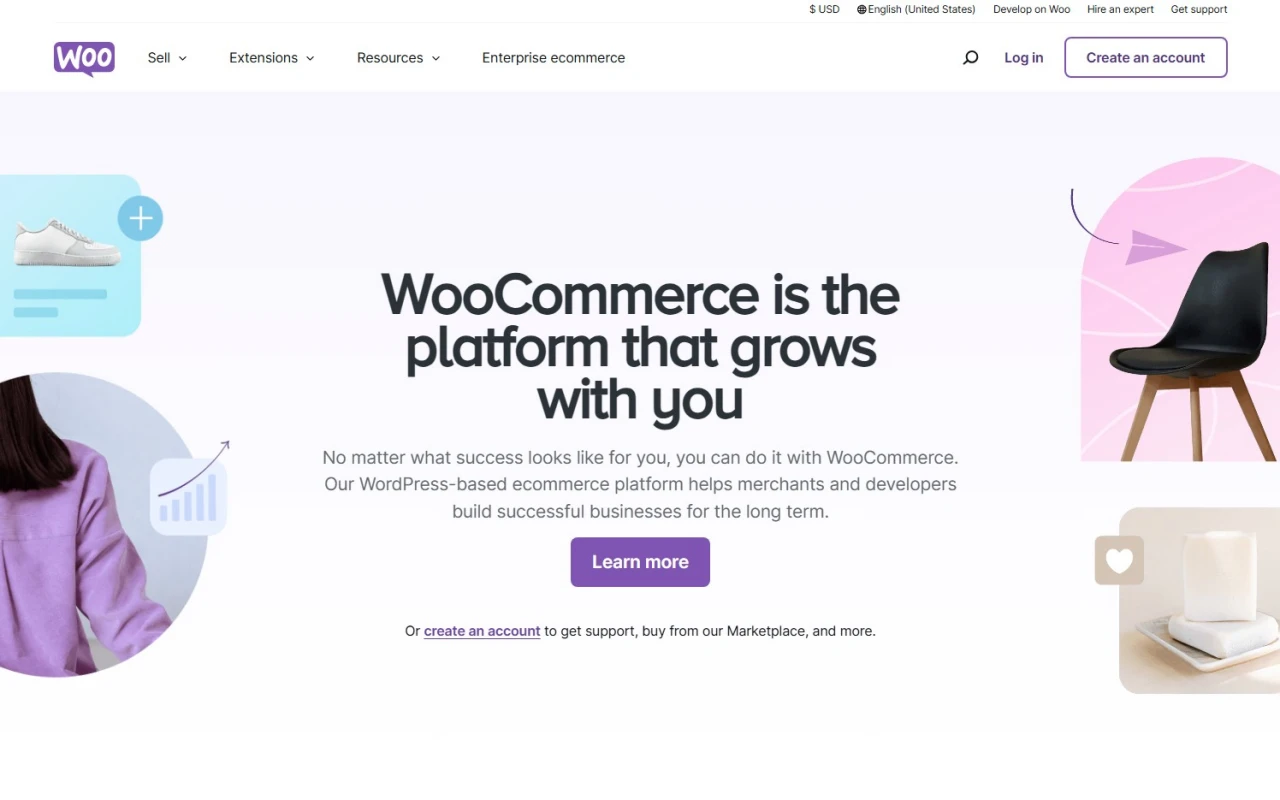
Why WooCommerce?
- Cost-effective: Free to install (though hosting and premium themes may incur costs).
- Highly customizable: With thousands of themes and plugins, you can tailor your store’s look and functionality to your needs.
- Extensive community support: Being open-source, a vast community of developers and users exists.
Downsides:
- Requires a bit more technical knowledge compared to Shopify.
- You’ll need to manage your hosting, security, and backups.
Pricing:
- Plugin: Free
- Hosting: ₹500 to ₹2,500/month (varies by provider)
- Premium Themes and Plugins: ₹2,000 to ₹15,000 (one-time cost)
Note: Costs for hosting and premium features are separate from the WooCommerce plugin itself.
Ideal For: Businesses that want complete control over their e-commerce store’s design and functionality.
3. BigCommerce
BigCommerce is another excellent alternative for Indian businesses seeking an e-commerce solution. Like Shopify, it’s a fully hosted platform, so you don’t need to worry about hosting or technical aspects.
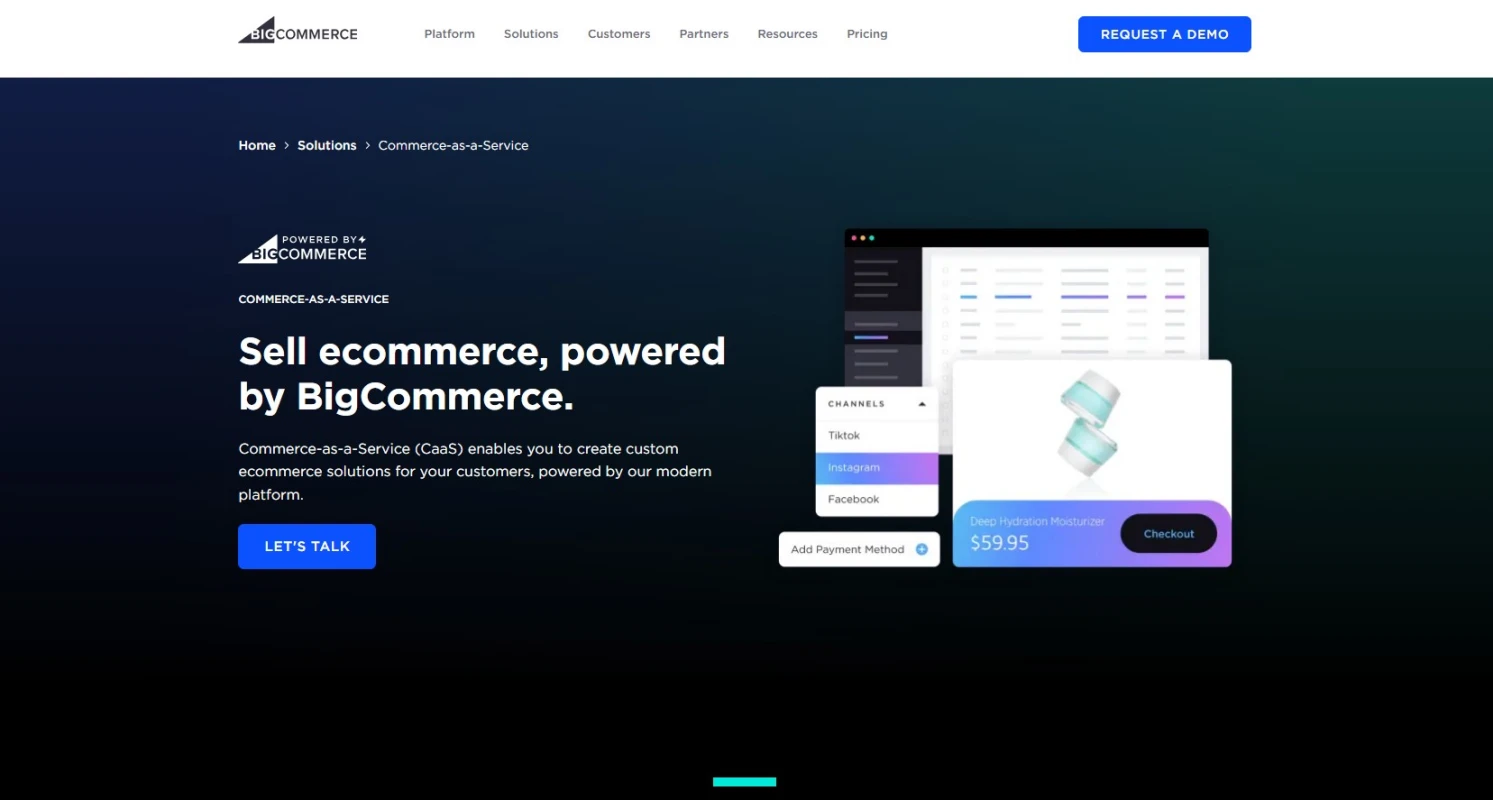
Why BigCommerce?
- No transaction fees: Unlike Shopify, BigCommerce doesn’t charge transaction fees on your sales.
- Powerful SEO capabilities: It’s known for excellent SEO features, helping you rank better on search engines.
- Multi-channel selling: Sell across different platforms, including Facebook, Instagram, Amazon, and eBay.
Downsides:
- Slightly higher pricing compared to some competitors.
- Some advanced customization options require technical skills.
Pricing:
- Standard Plan: ₹2,400/month ($29)
- Plus Plan: ₹6,600/month ($79)
- Pro Plan: ₹25,000/month ($299)
Note: Prices are subject to change and may vary based on additional services.
Ideal For: Medium to large businesses looking for a scalable solution without transaction fees.
4. Magento (Adobe Commerce)
Magento, now known as Adobe Commerce, is another powerful alternative, especially for larger businesses in India. It’s a highly flexible and scalable platform best suited for companies with a larger budget or technical team.

Why Magento?
- Highly customizable: Magento offers advanced customization features, making it ideal for larger, more complex stores.
- Scalability: Perfect for scaling up as your business grows.
- Strong community: There’s a large pool of developers available for hire.
Downsides:
- It can be expensive, especially for the Magento Commerce version.
- Requires significant technical knowledge for setup and management.
Pricing:
- Magento Open Source: Free (costs for hosting and additional features apply)
- Adobe Commerce (Cloud): Starts at ₹70,000/month
Note: Magento Open Source requires additional hosting, development, and maintenance investment.
Ideal For: Large enterprises or businesses with access to a development team looking for a fully customizable platform.
5. Dukaan
Dukaan is an India-specific Shopify alternative designed to help small businesses quickly set up an online store. It’s a mobile-first platform that focuses on simplicity. It lets you set up an online store in minutes, making it perfect for small businesses or those just starting.
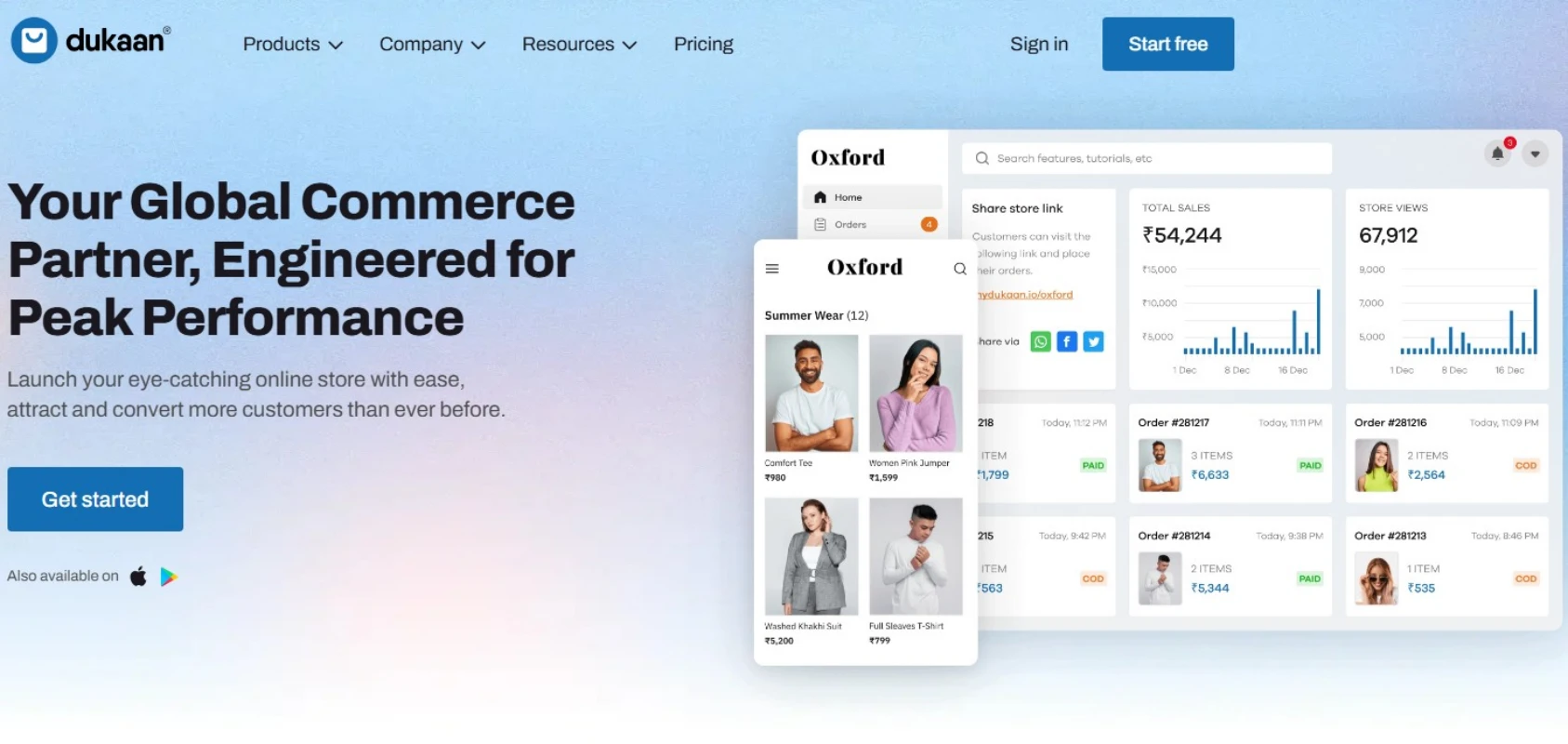
Why Dukaan?
- Simplicity: With an intuitive, easy-to-navigate interface, Dukaan requires no coding skills or technical expertise to launch an online store.
- Quick Setup: You can create your store within 30 minutes, making it one of the fastest e-commerce platforms for small businesses.
- Mobile App: The Dukaan mobile app is handy for busy entrepreneurs. It allows you to manage your store on the go.
- Local Payment Gateways: Dukaan supports Indian payment methods like UPI, Paytm, and PhonePe, making transactions convenient for sellers and customers.
- Affordable Pricing: Dukaan offers competitive pricing plans that cater to the needs of small businesses, making it accessible for startups and independent sellers.
Downsides:
- Limited Customization: Compared to more robust platforms like Shopify or WooCommerce, Dukaan has fewer customization options for themes and design. This can be a drawback for businesses looking to create a highly personalized online store.
- Scalability Issues: Dukaan is perfect for small businesses but may not offer the scalability needed for larger enterprises with more complex needs. As your business grows, you may find the platform’s features limiting.
- Less Advanced Features: Dukaan is built for simplicity, so advanced features like inventory management, detailed analytics, or third-party app integrations may not be as comprehensive as other platforms.
Pricing:
- Free Plan: For getting started
- Starter: ₹1,499/month
- Growth: ₹3,899/month
- Infinity: ₹14,490/month
Note: Dukaan’s pricing is designed to be budget-friendly, especially for small businesses.
Ideal For: Dukaan’s support for Indian payment methods and mobile-first design are significant advantages for those selling products locally or on a smaller scale.
6. Instamojo
Instamojo started as a payment gateway but has now expanded into a full-fledged e-commerce platform tailored for Indian businesses. It is trendy among small business owners, freelancers, and independent sellers.
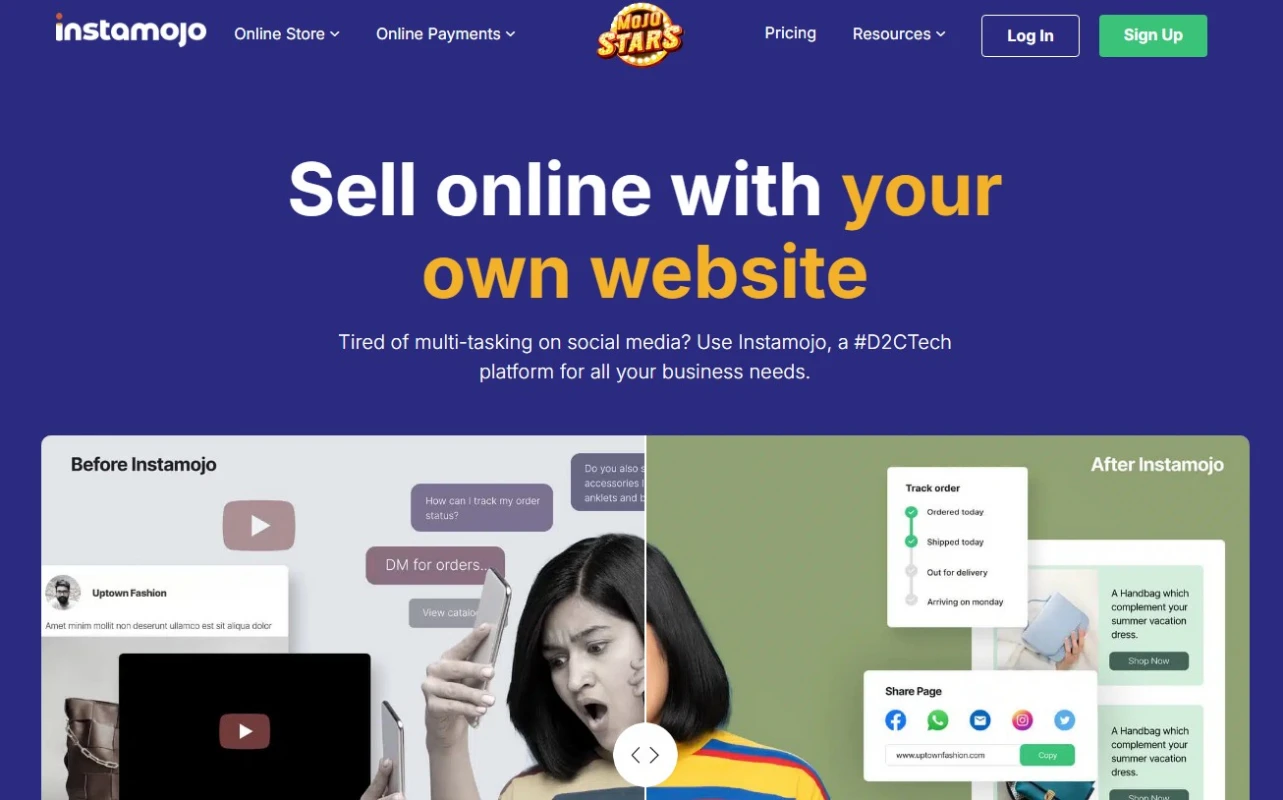
Why Instamojo?
- Local payment integration: Integrated with Indian payment gateways, making it easy to accept payments.
- Simple and quick setup: With an easy-to-use platform, you can start selling in minutes.
- Affordable: It has a free plan with basic features, making it ideal for small businesses and startups.
Downsides:
- It is limited to smaller stores with basic eCommerce needs.
- Fewer customization and advanced features compared to larger platforms.
Pricing:
- Free Plan: Basic features with transaction fees
- Paid Plans: Starting at ₹3,999/month for additional features
Note: Instamojo’s pricing can vary based on selected features and services.
Ideal For: Freelancers, independent sellers, and small businesses looking for a pay-as-you-go model.
7. OpenCart
OpenCart is an open-source, free platform, though you’ll need to pay for hosting and any additional features you might require. It’s highly customizable, making it an excellent choice for businesses with development resources.
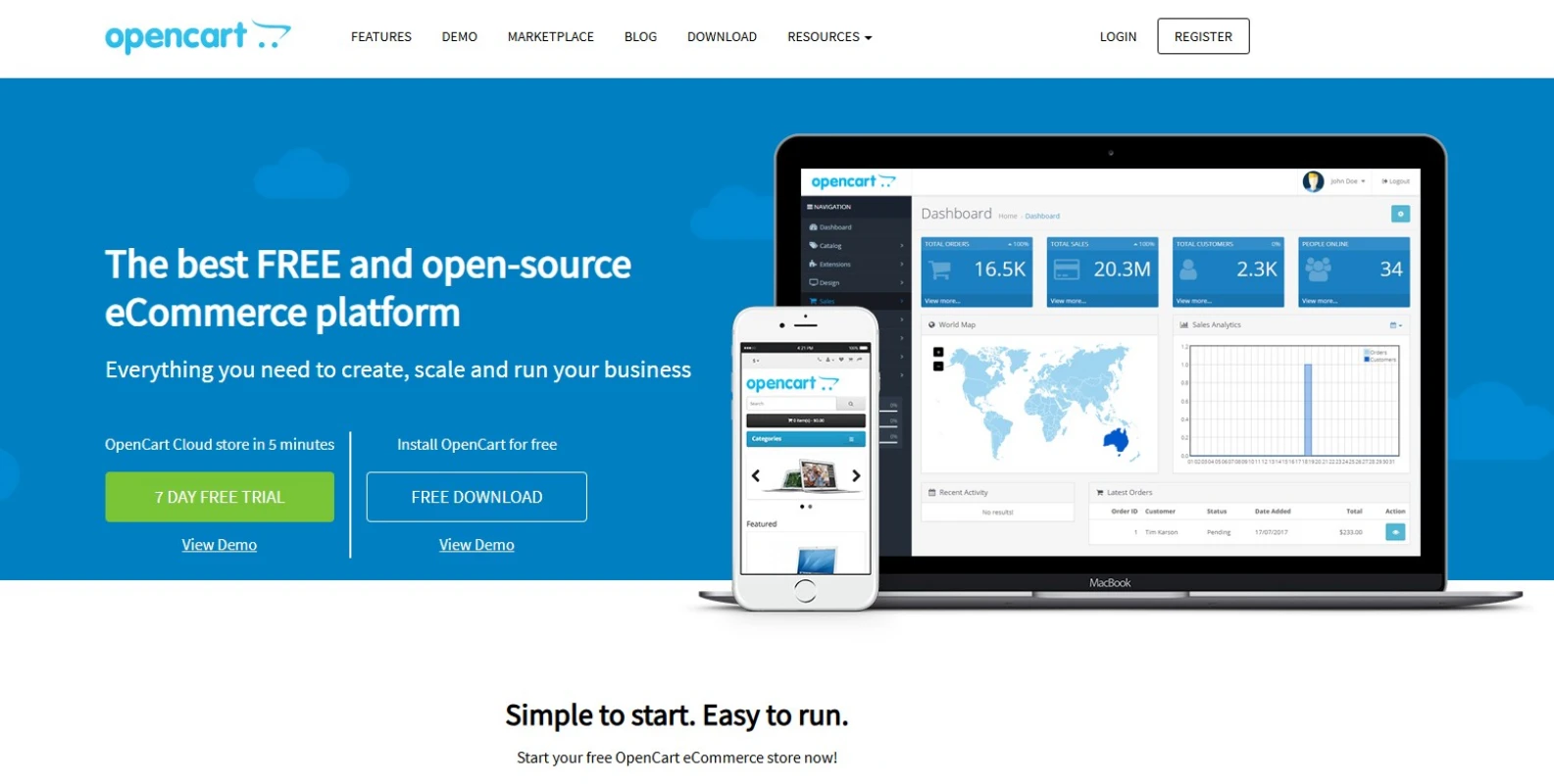
Why OpenCart?
- Free and open-source: You only need to pay for hosting and custom themes if desired.
- Multi-store functionality: Allows you to manage multiple stores from a single admin interface.
- Extensive extension library: Offers thousands of extensions and modules to customize your store.
Downsides:
- Requires some technical knowledge to set up and manage.
- Support is not as extensive as paid platforms like Shopify or BigCommerce.
Pricing:
- Platform: Free
- Hosting: ₹500 to ₹2,500/month (varies by provider)
- Extensions and Themes: ₹1,000 to ₹10,000 (one-time cost)
Note: OpenCart requires separate investments for hosting and additional features.
Ideal For: Businesses with access to a development team need a fully customizable and scalable platform.
8. Zepo
Zepo is a popular e-commerce platform tailored for Indian businesses. It offers a range of features that make it a viable Shopify alternative. Here’s a quick look at why you might consider Zepo and some potential downsides.

Why Zepo?
- Affordable Pricing: Zepo offers budget-friendly plans, making it accessible for startups and small businesses without heavy investment.
- Local Payment Integration: It supports Indian payment gateways like Razorpay and Paytm, ensuring smooth transactions for local customers.
- User-Friendly Setup: The platform is easy to set up and use, ideal for those without technical expertise.
- Local Support: Provides customer service in local languages and understands regional market needs.
- Marketing Tools: Includes SEO, email marketing, and social media integration features to help drive traffic and engagement.
Downsides
- Limited Scalability: Not ideal for rapidly growing businesses due to its limited scalability.
- Fewer Advanced Features: Lacks some advanced functionalities and integrations found on more comprehensive platforms.
- Customization Constraints: Customization options are more limited compared to other platforms.
- Limited Third-Party Integrations: Fewer options for integrating with other tools and services.
- Learning Curve: Some users may find the initial setup and learning curve challenging.
Pricing:
- Basic Plan: ₹1,000/month
- Pro Plan: ₹2,000/month
- Business Plan: ₹3,000/month
Note: Zepo offers various plans to cater to different business needs.
Ideal For: Startups and small businesses seeking a budget-friendly, India-centric solution.
9. Squarespace
Squarespace is known for its beautifully designed templates and easy-to-use interface. While it is more of a website builder, its e-commerce features are powerful enough for small to medium-sized stores.

Why Squarespace?
- Design-focused: Stunning templates that make your store look professional.
- All-in-one solution: Hosting, domain registration, and website building in one package.
- Easy to use: No technical skills are required to set up or manage.
Downsides:
- Limited eCommerce features compared to platforms like Shopify and BigCommerce.
- It’s not ideal for large-scale stores.
Pricing:
- Personal Plan: ₹1,300/month ($16)
- Business Plan: ₹2,000/month ($23)
- Basic eCommerce Plan: ₹2,400/month ($28)
- Advanced eCommerce Plan: ₹4,400/month ($52)
Note: Pricing may vary based on additional features and plans.
Ideal For: Businesses that prioritize design and aesthetics but still want rich eCommerce features.
10. Zoho Commerce
Zoho Commerce is an India-based e-commerce platform part of the broader Zoho suite of applications. It offers a comprehensive solution for businesses looking to sell online and integrates with other Zoho services like CRM, inventory, and more.
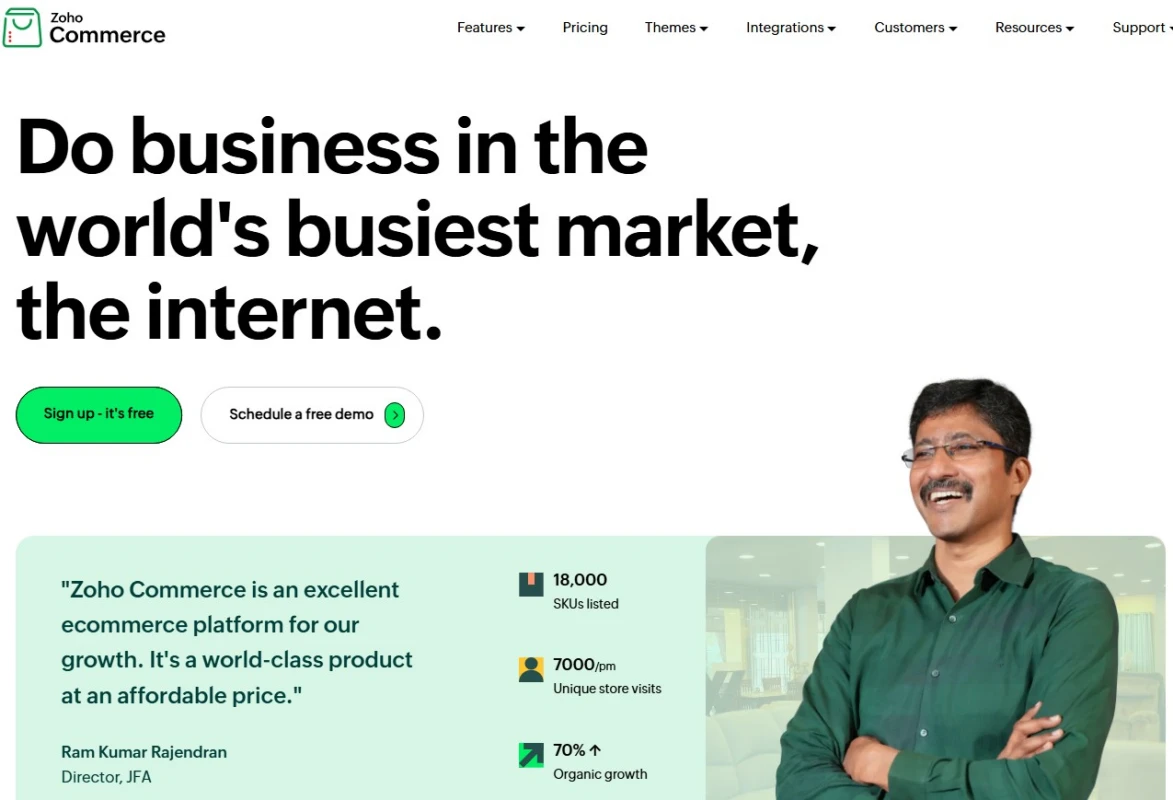
Why Zoho Commerce?
- Integration with Zoho ecosystem: This is a seamless choice if you already use Zoho apps.
- Cost-effective: More affordable than Shopify, especially for small businesses in India.
- Local payment gateways: Supports local payment gateways like Razorpay and Paytm, making it easy to manage payments in India.
Downsides:
- Limited customization compared to WooCommerce or Magento.
- Fewer third-party integrations are available.
Pricing:
- Standard Plan: ₹799/month
- Professional Plan: ₹2,399/month
- Advanced Plan: ₹5,599/month
Note: ZohoCommerce offers different plans to match various business requirements.
Ideal For: Zoho is perfect for businesses seeking an all-in-one platform with extensive customization and tiny to medium-sized enterprises with diverse needs.
Comparing Shopify Alternatives: Which One is Right for You?
With so many Shopify alternatives, how do you choose the right one for your business? Here’s a quick comparison based on different business needs:
Best for Small Businesses
If you’re starting or running a small business, Dukaan or Instamojo are excellent choices. Both platforms offer quick setup, affordable pricing, and local payment integration.
Best for Large Enterprises
If you’re managing a large business with complex needs, Magento and BigCommerce are the platforms to consider. They offer scalability, customization, and advanced features that can handle high-volume sales.
Best for Customization and Flexibility
WooCommerce and OpenCart provide extensive customization options, perfect for businesses that want complete control over their store’s design and functionality. However, they do require more technical knowledge.
Best for Affordability
Zepo, Zoho Commerce, and Dukaan are the best alternatives for businesses looking for budget-friendly options. They offer essential features without the high costs associated with platforms like Shopify.
Conclusion
While Shopify is a popular e-commerce platform, it’s not always the best choice for every business, especially in India. Depending on your needs—affordability, customization, or local payment integration—there are plenty of Shopify alternatives. Platforms like Dukaan, Instamojo, WooCommerce, and OpenCart offer great options tailored to Indian businesses. So, take your pick and start building your online store today!
FAQs
1. What are the most affordable Shopify alternatives in India?
Platforms like Dukaan, Zepo, and Zoho Commerce offer affordable pricing plans for small and medium-sized businesses.
2. Can I migrate my Shopify store to another platform?
Yes, most platforms, including WooCommerce and BigCommerce, offer migration tools or services to help you move your store from Shopify.
3. Which platform is best for a small business that is starting in e-commerce?
Dukaan and Instamojo are excellent options for small businesses due to their ease of use and local market focus.
4. What is the best option for customization and control over my store?
WooCommerce and OpenCart offer the most customization and control, although they require some technical expertise.
5. Are Shopify alternatives beginner-friendly?
Yes, platforms like Wix, Dukaan, and Instamojo are beginner-friendly and don’t require coding knowledge to set up an online store.


